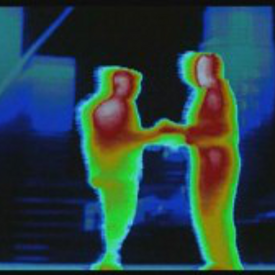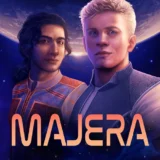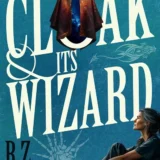
OBIR: Occasional Biased and Ignorant Reviews reflecting this reader’s opinion.

Nothing Without Us Too
Published September, 2022, by Presses Renaissance Press out of Gatineau, Quebec, Canada.
Editors: Cait Gordon and Talia C. Johnson
Cover art: April Laramey
Note: Every story is about a disabled or handicapped individual. Every story is written by a disabled or handicapped individual. This is a window on a world most people know little or nothing about, presented in the form of genre-related fiction.
Foreward: – by Amanda Leduc
Amanda describes the two handicapped children in the famous 1911 children’s book The Secret Garden by Frances Hodgson Burnett. Though sickly, they are eventually cured by outdoor living and fresh air. In general, fantasy and speculative fiction has always treated disabled people as a problem to be solved, either through mode of life or the advent of appropriate technology. Seldom have the disabled been rendered as fully rounded characters identical to all other human beings apart from their individual handicap. Too often they are victims of circumstance waiting to be saved by those who somehow know how to save them. And, of course, they are expected to be grateful.
Hence Amanda’s pleasure to introduce a collection of stories written by disabled authors presenting their insights into the difficulties they face in their lives. One thing all these stories have in common is an underlying honesty and sincereity. This renders all the stories vivid and impactful. Powerful stuff. And quite out of the ordinary.
Tour of the Facilities – by Sienna Tristen
Premise:
Would you stay at the perfect hotel?
Review:
I’m kidding of course. So is the author. Just as music can be hell for a person with acute perfect-pitch hearing, or verbal communication a nightmare for someone with eidetic memory (total recall—with every concept triggering a thousand thoughts, each in turn triggering etc.), so people afflicted with an unusual focus on sensory input of any kind are liable to live in a perpetual state of annoyance approaching madness. Is the “fault” heightened senses? Or simply an enhanced awareness of normal sensory input? I doubt anyone knows a definitive answer.
At a superficial level this is a hilarious list of minor inconveniences most hotel guests ignore or barely notice. But it’s really a horror story demonstrating how “normal” flaws result in a harrowing, oppressive environment subjecting sensitive individuals to perpetual pain. “Stop being so sensitive” is not a useful piece of advice. Might as well say “Stop using your ears” in front of a bank of speakers at a rock concert.
The only genuine solution I can think of is for hotels to offer sensory deprivation chambers. Not very practical. Basically, people with abnormally keen senses simply have to live as best they can, often by avoiding the most egregious outputs. Sadly, many tend to withdraw from human society to greater or lesser extant, even choosing to be hermits. How would you feel if you were listening to fingernails screeching along chalkboards 24/7? So, cut sufferers some slack. They’re undergoing lifelong torment.
A humorous story, yes, but also powerful in its underlying message.
Saving the World at the Bat Outta Heck Mart – by Meg Candelaria
Premise:
One thing about Vampires, they are neurotypical.
Review:
So the Vampire walks into a late-night convenience store expecting the usual. But the nice young girl behind the counter doesn’t bat an eye. She’s so used to misinterpreting what customers are up to that the tall guy with the cape doesn’t strike her as being atypical in any way. Vampires aren’t used to being taken for granted. The encounter is awkward for both of them.
The story makes an important point. In a sense, all of us neurotypicals (I’m making an assumption about myself here—I could be wrong) are Vampires, in that we are just as inexplicable and alien as Dracula himself. But I’ll go out on a limb and reveal that most neurotypicals don’t understand people either. I’m not being facetious. I genuinely believe most people don’t have a clue; they just float in a context of assumptions and expectations as if it represents reality. I sometimes suspect non-neurotypicals are simply more honest with themselves, hence their greater level of confusion. Then again, maybe I’m not as neurotypical as I think I am. One thing for sure, I feel much empathy for those who are even more puzzled about human behaviour than I am.
At any rate, I found this story quite funny and highly original.
Pulling Futures, Plucking Thyme – by Avi Silver
Premise:
Not easy, while in the grip of a manic episode, to practice an ancient form of magic dependent on clearly defined limitations.
Review:
I’m unfamiliar with the concept of “pulling,” of gathering items within the limits of a basket in order to weave a magic of accomplishment. No idea if this is original with the author or a time-honoured common practice. It does strike me as ideal for detail-obsessed witches. If the large is too large, concentrate on the small.
Of course, while indulging the grandiose whims of manic enthusiasm, grasping as much as possible seems perfectly logical even if the basket overflows and chaos ensues. It’s what you do when awakening in the depressive stage that is the subject of metaphor here. For a story concentrating on the meaning of failure, it is fundamentally optimistic, rather charming, and even poetic. I like it.
Why I’m Deleting My Account – by Cal G. (AKA @RandomTDotQweirdo) H.E. Casson
Premise:
When your own mother can’t remember what colour your bedroom walls were.
Review:
Essentially the story of a lesbian utilizing social media for self-therapy, what with family rejection and identity issues threatening to tear them apart. Nothing straightforward or clinical in the account. For one thing, there’s an emphasis on the magic, literal magic, of a temporary but pleasing relationship. And also the question of whether social media is magical or a curse.
What most impresses me about this story is the deft use of striking images and analogies to express the raw complexity of a young woman coming to terms with the truth of their basic nature. Certain “cultural” habits of lesbians suddenly make sense to me. Having met and known people of various life-styles throughout my life I usually take for granted whatever the context of their life is, but often without any real understanding. This story allows certain aspects to stand out in absolute clarity, to my great surprise. Nothing less than a revelation. I now have renewed respect for them as struggles with self-discovery of any kind. Very educational, this story.
Health Benefits – by Jessica Corra
Premise:
Ordinarily, finding a dead body would be considered a bad thing.
Review:
Long, long ago, Canadian activist Dr. David Suzuki pointed out there was no reason to get excited about organ transplants and the even more sophisticated surgical procedures to come. He said something to the effect that in most societies only the power elite would have access to such. For ordinary people, and especially for the poor, it would be as if the technology did not exist. This near-future story lives up to his premise. Bio-surgery is available only to the rich.
In this tale, Fayth, a young girl with numerous physical disabilities, depends on the feeble ministrations of public charity. One freezing cold day in a Calgary winter she discovers a dead man wearing a magnificent winter coat. Of course, she steals it. Her own threadbare coat isn’t adequate. Naturally she hides the body. Then she finds out there’s a huge monetary award awaiting anyone who discovers the body and reveals its location. Enough money to buy needed surgery.
But this story isn’t about the mere act of the plot. It’s all about attitudes, namely those of the disabled, the abled, and all who seek to exploit both. It’s an exploration of the greed underlying generosity, the resentment of those who receive, and the cynical lust for human interest stories on the part of the media. To put it another way, it’s all about the human nature enveloping the conundrum of how to help those in need. All about the complexity with which we treat even the simplest of problems.
Essentially, this story is a vivid glimpse of reality. But we mustn’t let reality tarnish what most people prefer to see as “feel good” tasks. Cynicism should not stand in the way of helping the helpless. Who cares if altruism, whim, or even self-aggrandisement is responsible? Motivation doesn’t matter. Despite, or perhaps because, being so insightful about every aspect of the emotional baggage surrounding charity, this story makes it absolutely clear that the only thing that counts is the end result. A useful reminder, this.
Orange Rope for Sale – by N.R.M. Roshak
Premise:
Being trapped at home makes life difficult. Also ruins Cinnamon Crunch cereal.
Review:
Two people discover they can’t go further than 10 metres from their apartment. They both live in the same building, albeit on different floors, and each has something to sell. The rope comes in handy. They can raise and lower items to each other’s apartment. Eventually they hit upon the idea of pooling their resources to resolve the 10 metre “bubble” mystery.
This is a light, whimsical tale. At the same time it is a fantasy approach to the problem of extreme agoraphobia, the fear of entering the crowded world outside the secure confines of one’s home. No practical solution is offered. Rather, part of the fantasy is that there is a solution, providing one strives to find one. In that sense, an optimistic story. The value of the story is that it makes it easier for non-sufferers to visualize the kind of suffering agoraphobics go through. Yes, some people spend years living at home. There they feel safe, but also bored and frustrated, and maybe worse. They are not to be envied. Nor pitied, for that matter. But anything that offers understanding which allows others to provide moral support to those venturing outside is well worthwhile. Definitely an educational and enlightening story.
Neurodivergent Hire – by Cathy Smith
Premise:
A tendency to hear multiple voices in your head is unlikely to impress the telepaths reviewing your application for hire by the Imperial Thought Police.
Review:
Rita suffers from a “schizoaffective disorder.” Her mind is always babbling with personalities arguing with each other. They only unite to argue with her. The cybernetic, possibly A.I. telepath officer interviewing her finds this chatter intensely annoying. Still, he, or it, is willing to explore all possibilities. You never know who might be useful.
What is particularly intriguing about this story is the occasional glimpse of laws and customs that have evolved to counter the all-pervasive omni-presence of the ever-watchful A.I.s. Automatic protection from the follies of youthful social media outbursts, for instance. But watch out once you become a legally responsible adult.
At first I was stymied trying to think of a connection to the theme of this anthology. Then it struck me the story was hinting that genuine A.I. would probably not be neurotypical, and that therapy, psychoanalysis, and neurodivergent thinking could well be powerful weapons to control or at least subvert the influence of A.I. overlords. Human diversity may prove to be useful in preventing the homogenization of the human mindset. I like to think so. This story an interesting and original Interpretation of future human/machine interaction.
Visiting Hours – by Stephen Graham King
Premise:
When you walk outside to go for lunch and the world explodes, you know you’re in for a bad day.
Review:
Really, it was mostly the immediate environment around Touraj which exploded. He’s lucky in that he lost only his right arm and most of his legs, plus sundry other bits and pieces. Three people who are in part responsible for his wounds, but also for his survival, visit him to lift his spirits. He’s still in shock, still in mourning for his lost body parts, but he has the presence of mind to listen.
I was a bit disappointed in the remainder of the story. Nothing really happens other than the turmoil in his mind as he struggles to get over what happened to him, attempts to give up the blame game, and contemplates the numerous options the marvelous medical technology of the future can offer him if only he stops feeling sorry for himself and becomes proactive regarding his future.
This is undoubtedly the whole point of the story, to illustrate the emotions and thought processes of a newly disabled person struggling to cope. Other people can help, but everyone knows deep down inside that it’s really up to the victim to determine what becomes of their physical and mental abilities. This story is exceptionally clear about that. Hence its value to the reader. A proactive object lesson.
Fishing in Martian Waters – by Bernadette Gabbay Dyer
Premise:
The creek near the cottage is named Martian Waters. Nobody knows why. Is there a reason?
Review:
The family always visit the cottage in Summer. Jayden’s older brother likes to play the flute, though lately he’s been getting more and more interested in girls. His young sister Ella just likes to explore. Jayden himself, whose eyes are bad from glaucoma, who tends to see things no one else notices, is cautious but curious. He likes studying the reddish rocks in the creek, imagining they are Martian rocks, and that their inhabitants, water snails with endearing eyestalks, are Martians. Often, he will sit for hours lost in his Martian reverie while Ella splashes up and down the creek, never bored and never still. Brother Nate seldom joins them, but it matters not.
One day, not only does Jayden see things no one else sees, they see him. What you call a life-changing event. Can’t describe what happens as that would be one spoiler too many. I’ll just comment that it puts the story into the realm of fantasy.
So, what’s the point of the story? It seems to imply that glaucoma, indeed any vision handicap, allows the afflicted to compensate through stretching their imagination, adopting an inner vision as it were, and this can be the key to a satisfying and rewarding life, depending on choices made.
To put it another way, depending on what we can see around us to define the possibilities in life is itself a handicap, given that many people grow up in constrained and limited environments, their situational-awareness covering but a small percentage of what life has to offer. Even if you have 20/20 vision and aware of everything around you, it’s not enough to explore your full potential. Hence the importance of leaving home, going to college, or travelling the world. Even so, if you lack imagination, you’re still handicapped. Imagination is the spur to true learning, to freedom of mind and purpose. In that sense visual impairment is relatively insignificant. Imagination allows you to rise above your limitations, frees you choose your best course in life if you but grasp it.
Of course, I could be way off base. Still, the way I see it, this story is a breath of fresh air, a burst of optimism, in the face of what otherwise might be a debilitating physical flaw. A delightful antidote to negative thinking. Very useful indeed.
Note: The anthology contains a further 18 stories which I’ve not had time to read but believe are probably of the same high calibre as the ones I review above. This because the editors proved excellent in their choices as far as I got and I’m positive they carried on in the same vein for the rest.
CONCLUSION:
I think this is an important and significant sequel anthology every bit as memorable and inspiring as the first one, “Nothing Without Us,” which I reviewed back on March 27, 2020. The second volume is full of innovative, original concepts which fill in many blanks in the minds of readers whose grasp of disabled lives is generic and hindered by ignorance. I truly believe reading “Nothing Without Us Too” will lead to greater empathy and understanding on the part of the abled.
At the same time, let me point out these stories are not mere lectures. They are also fascinating and entertaining to read. In fact, a wonderful anthology. I give it my highest recommendation.
Check it out at: < Nothing Without Us Too >








